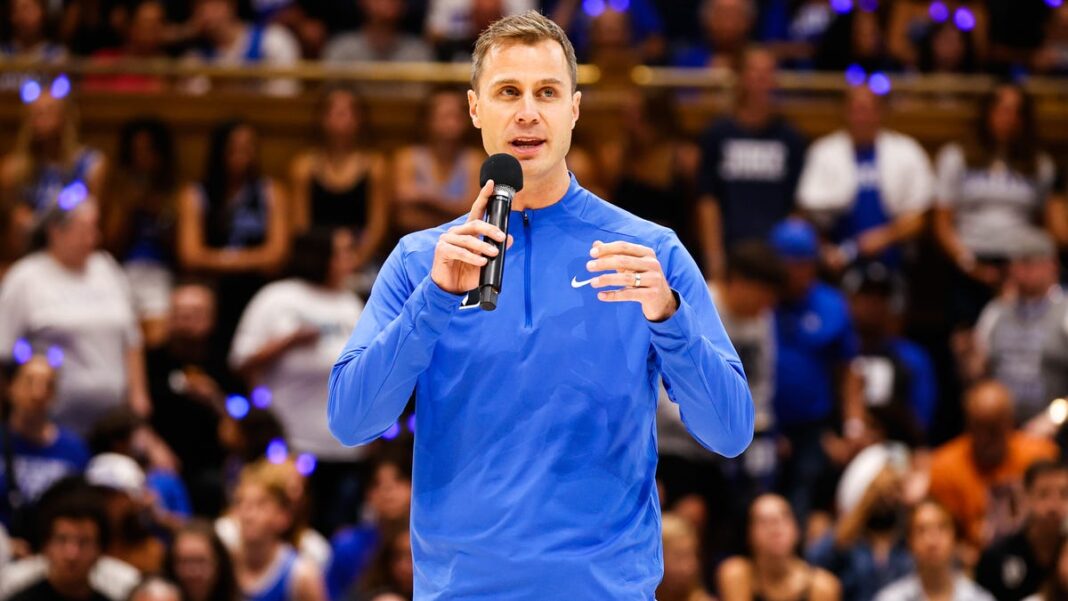Opinion: Jon Scheyer of Duke Faces Distinct Pressure with Top Recruit Cooper Flagg
CHARLOTTE, N.C. — At 37, Jon Scheyer leads one of college basketball’s most closely watched programs, and he’s found a confidant in Marcus Freeman, the 38-year-old coach of college football’s own scrutinized institution.
No one in sports might resonate more with Scheyer’s challenges during his initial two years at Duke than Freeman. Both coaches understand the specific pressures of being the new head coach after legendary figures, with Scheyer succeeding Mike Krzyzewski at a storied program.
“Very few people truly empathize with what that feels like,” Scheyer noted. “We’ve shared some valuable moments together.”
Both coaches are perpetually measured against their predecessors, constantly compared to their forerunners, and forced to uphold expectations that often feel overwhelming.
In his first two seasons, Scheyer has achieved a 75% winning rate, secured an ACC tournament title, and led his team to the Elite Eight. Such accomplishments typically silence doubts about his youth, inexperience, or perceived temperament for such a monumental role.
However, lingering questions remain—especially over the coming six months, particularly with the addition of the top prospect in the nation, Cooper Flagg, to the team.
While Scheyer has been surrounded by exceptional talent since the start of his tenure, he has yet to experience the level of scrutiny that will undoubtedly accompany Flagg’s first appearance as a 17-year-old on the court.
Scheyer can draw on past experiences as a player and assistant. Duke is prepared for the buzz that comes with elite recruits, having successfully navigated prior instances with stars like Brandon Ingram, Jayson Tatum, Zion Williamson, and Paolo Banchero.
Yet, the situation with Flagg is poised to be unprecedented. He’s not just the top choice for the 2025 NBA Draft; he already boasts an impressive highlight reel from competing against the U.S. Olympic team, where he proved himself against seasoned NBA players.
Additionally, his racial background is likely to spark conversations about culture and athletics surrounding Duke, regardless of the school’s preferences.
This could easily turn into a media frenzy.
For Scheyer, it will measure his capability: How much talent is necessary to achieve success in March?
During the ACC’s preseason media day, I asked Scheyer if Duke had a strategy for managing the intensity surrounding Flagg. He referenced the “volatile nature of our world” and emphasized the importance of remaining composed amid external praises or criticisms following performances.
However, the brunt of scrutiny will likely fall on Scheyer, not Flagg, this season.
“That comes with the job, right?” Scheyer remarked, opening up about his camaraderie with Freeman, fostered through a mutual acquaintance. “I’ve admired his journey—in one week you can be hailed as the best coach after a victory over Texas A&M, and then after losing to Northern Illinois, suddenly you’re the worst. It’s about maintaining stability. Coaches experience fluctuations, and it’s not personal.”
Although it’s not personal, the criticisms can appear somewhat unjust.
Freeman has faced doubts regarding his ability to ensure consistent focus and intensity for his team, as inconsistencies in Notre Dame’s performance have raised eyebrows.
For Scheyer, lacking the intimidating presence of Coach K—who secured five national championships—could prompt concerns among Duke fans questioning whether he possesses the necessary qualities to meet towering expectations, especially when the Blue Devils falter.
Such critiques often rely on stereotypes about younger coaches and are rooted in narratives lacking substantial evidence. The reality of coaching is often behind-the-scenes work that remains unseen, influencing a college program’s culture through myriad decisions and conversations.
Instead, we often judge outcomes based on preconceived notions of what they should be. For Scheyer, there are two valid interpretations of his results.
On one hand, his first two seasons have been quite successful by most criteria, particularly in light of the youth of the teams he has fielded, especially as age tends to favor success.
Conversely, Scheyer’s recruitment of eight five-star talents, coupled with several four-star players, has not manifested in the dominance expected. Last season concluded with a heartbreaking loss in the Elite Eight to NC State, where the Blue Devils were favorite to reach the Final Four.
One notable observation: Many players have not enhanced their standings as NBA prospects while playing under Scheyer’s guidance. Several top recruits have opted to transfer to different schools. The highest pick among them was Dereck Lively, who was selected at No. 12 overall.
Is this a reflection of Scheyer’s coaching? Were these players overrated during their high school years? Will they find greater success at different institutions?
Answering these questions isn’t straightforward, especially considering the limited data available. However, they highlight the importance of this upcoming season, as the standout No. 1 prospect not currently in the NBA is now a part of the Duke team. This season needs to yield positive results, and merely reaching the Final Four isn’t sufficient. Scheyer must demonstrate to elite recruits that he can help them achieve their aspirations of NBA success—both are crucial aspects of Duke’s current approach.
This level of pressure is something perhaps only one other individual in college sports can truly comprehend.
“I tell our players, and I remind myself—staying away from Twitter is in my best interest; it doesn’t offer any benefits, even if someone claims I’m the best coach in the world. That doesn’t help,” Scheyer stated. “Concentrate on what you can influence. Amazing things can happen when you do that.”
While it’s still early, Scheyer has yet to orchestrate any remarkable outcomes at Duke. With Flagg now part of the team, it’s time to start making things happen.

